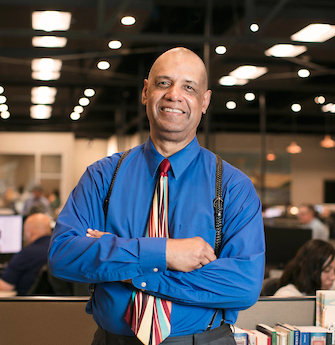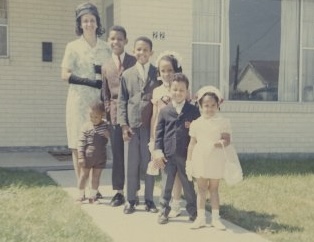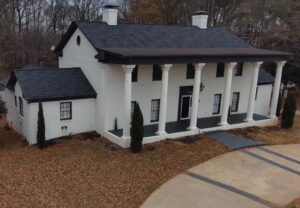I am New Orleans.
Hurricane Betsy, Hurricane Katrina, and other powerful storms tried to take away our connections to the world’s most culturally-rich city, but they couldn’t. They didn’t realize that this place has a pull unlike any other. It’s hard to explain, but think about the deepest, fastest, hardest “love” you felt for someone you knew wasn’t good for you – yet you kept returning because it was … sooooo good … and you couldn’t pull yourself away. Just another minute became just another hour, just one more day, just one more weekend – and then you’d promise you were done.
But, really, you weren’t.
New Orleans is a special place. Natives are born into what we’ve got. Visitors or tourists sometimes find us so charming that a single visit becomes an annual visit, and some annual visitors end up visiting three or four times a year then become our neighbors.
New Orleans has that kind of pull.
We’re different, and we like it like that.
Some of you live in places with earthquakes, snowstorms or tornadoes. To show you how different we are, share the names of your worst earthquake, your worst snowstorm or your worst tornado. I thought so. You can’t. I can.

Hurricane Betsy. Hurricane Camille. Hurricane Ida.
Each was a major hurricane. Each took lives. Each damaged a lot of property. Each displaced people. Each changed our collective lives in ways more important than dollars, highways and streets.
Hurricane Katrina was one of our worst. Counting direct, indirect, and deaths with uncertain causes, we lost more than 1,300 souls, mostly in Louisiana and Mississippi. The hurricane caused about $125 billion in damage — that’s billion, with a B. It was the costliest and deadliest hurricane in our history.
Fortunately for me, I missed that one. I left home after high school and I permanently changed my voter registration address and my driver’s license after college. I visited my home city often. I couldn’t stay away. I was a native visiting for decades, so I missed some bad storms. I’m glad I missed Katrina, though I feel I didn’t.
Those who love the city and lived elsewhere were living vicariously through the lives of others’ Katrina experiences – when we could find them. The day Katrina made landfall our levees broke, releasing storm surge far greater than we could’ve imagined. Our city lost power. There was no cell service. Forget about reaching family and friends by phone or email. Many relied on local radio, asking on-air talent to share the names of the missing, asking anyone who could help to make it better by letting the world know that they were okay. About 80 percent of the city’s people left to get out of Katrina’s way. Others stayed. Some stayed because they had voluntarily evacuated earlier, only to return home to face a mandatory evacuation order.

Some of the people who left came back to find homes that were inhabitable. Others who intended to return never did.
When I visited home not long after Katrina, it was one of the most eerie experiences ever. A city known worldwide for loud, noisy, and unabashed fun and partying was quiet. Really quiet. There were few businesses open. There were limited places to get gas. Most restaurants, even fast food places, were closed.
It was so quiet because huge trees that had limbs and leaves blowing in the wind only days before were on the ground or leaning on buildings and fences. It was so quiet because our normal bird chirps were missing. Like human beings, our normally cheerful birds had lost habitats, trees where they had built nests and found shelter, and there was little vegetation to eat.
New Orleans lost thousands in population. New Orleans lost some of its housing stock. New Orleans lost some of its culture, too
A lot of New Orleanians went to Houston. Quite a number went to Baton Rouge. And Atlanta. Some went to Indiana, Nebraska, and anywhere the bus they caught let them out. You should thank us for sharing some of our people and some of our culture with you.
Twenty years later, our city is still hurting. So many have wounds that have healed, leaving ugly scars that replaced elegant and shiny melanin. Yet some have made new lives, Katrina lives, that have provided better lives than those they lived pre-Katrina.
Twenty years later, we go to some of our old neighborhoods and homes and we see hoods without neighbors and houses that aren’t homes. Yet some have more education than they might have had otherwise, better jobs and nicer homes.
RELATED: Will Sutton returns home to New Orleans
RELATED: Will Sutton writes about his return home to the Crescent City
Twenty years later, we don’t recognize our public school system because the State of Louisiana took it from us and told us what we had was so bad that this was an opportunity for recovery and renewal. We got an all-charter school system. It wasn’t what we asked for. It is what we got. Some of our kids have had better educations and earned high school diplomas. But too many of them can’t read at grade level.
Twenty years from now we’ll look back and remember Katrina and all it took from us. But we’ll realize that we got so much more as we dust ourselves off, get back in the game and demand better.
Katrina knocked us down, but it didn’t take us out.
Call it what you will, but we’re doing better now than we have been. And we’ll be even better in years to come.
We are New Orleans.
I am New Orleans.
__________________________________________________________________________
Will Sutton is a New Orleans native. Born Uptown, he grew up in the city’s Lower Ninth Ward and Gentilly neighborhoods, and graduated from St. Augustine High School and Hampton Institute, now Hampton University. He started his journalism career at St. Aug,, working on The Knight, the student newspaper. Sutton worked for a Black weekly in Norfolk, Virginia, the daily morning newspaper in Providence, Rhode Island, and The Times-Picayune in New Orleans while a college student. His professional career has included a Gannett newspaper in New Jersey, Knight-Ridder’s The Philadelphia Inquirer, the Post-Tribune in Gary, Indiana, McClatchy’s News & Observer in Raleigh. He’s taught at three higher education institutions, including two HBCUs, Hampton and Grambling State University. Sutton served as president of the National Association of Black Journalists’ 13th president from 1999-2001. Email him at nabjpresident13@gmail.com, or find him on Instagram (@editorwillsutton), LinkedIn or Facebook.





